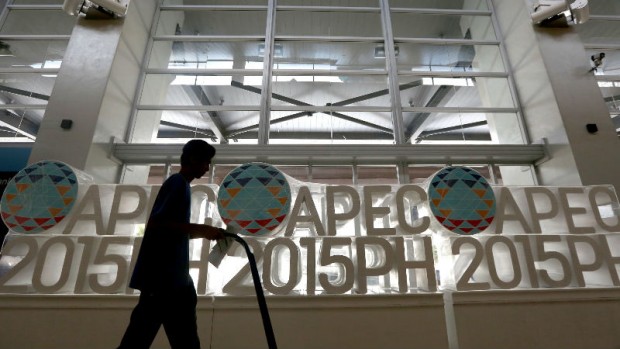From the Christian Science Monitor (Nov 12):
US Navy edges back to Subic Bay in Philippines – under new rules
The US – which was booted from the naval base in 1992 – is being seen in a new light here as China continues to claim large swaths of the South China Sea.

Olongapo, Subic Bay, Philippines — When this Philippine coastal town rid itself two decades ago of a giant US naval base, it wanted to shake off a colonial past and reject the “ugly Americans.” Yet today the town is once again welcoming American military personnel and viewing the US as a vanguard against an increasingly pushy China.
The US Navy began using the base in Subic Bay last year to deliver materiel and personnel for annual joint military exercises. Some 6,000 US personnel came to Subic in April, and are set to return for exercises in 2016 in agreement with Philippine authorities, according to a Western diplomat. US ships are using Subic Bay as a resupply port during routine calls, and two towering merchant marine ships flying American flags were docked here in late October.
On Nov. 17, President Barack Obama is to visit the capital, Manila, as part of a regional economic cooperation event, and he and President Benigno Aquino III are expected to solidify military ties including use of the 60,000-acre Subic facility that the US formally left in 1992.
The return of the Americans follows a deal hammered out with the Philippine military last spring. The Enhanced Defense Cooperation Agreement grew out of concern over China’s spread into waters just off the coast here, and China's claim over more than 80 percent of the South China Sea that extends far below the Chinese mainland.
In Olangapo today, a city of 220,000, enthusiasm is strong for a US return. That's due not only to the perceived China threat, but also because the Philippine armed forces, not the Pentagon, will govern the sprawling old base with new rules designed to curb off duty behavior.
After World War II, Subic gained prominence as the largest US naval facility in the Pacific, cherished for its deep water, sheltered spots to anchor ships, and elaborate repair infrastructure.
Yet during the heyday of Subic, US naval personnel gained notoriety for helping turn the area into a zone of hostess bars and prostitution that fostered local crime.
Now, the returning military must stay on approved parts of the base, which has added a well-groomed Harbor Point shopping mall with cinemas and some 200 stores including Starbucks, TGI Friday's, and eventually Gold’s Gym. A midnight to 5 a.m. curfew will be enforced around the base.
To short-circuit charges of a new form of colonialism, the Subic Bay Metropolitan Authority, a local governing body, is authorizing Philippine forces to oversee the former base and its returning inhabitants in segments of 15 years.
“My opinion is that US presence within Philippine military bases will be accepted by both the government and the public,” says Ramon Casiple, executive director of the Philippine advocacy group Institute for Political and Electoral Reform.
“However, there should be safeguards to avoid crime incidents involving the local civilian population, since this historically had started the public opinion against US military bases,” he says.
Since the US left, the Barrio Barretto hostess bar district has dropped from 60 to 27 clubs. But problems continue: Last year, a Marine private was charged with killing a transgender man in a local hotel room.
Filipinos, who were colonized by the US from 1898 to 1946 after three centuries of Spanish rule, had resented the US military continuing presence after the end of World War II in 1945.
Now, however, Manila sees China as the regional bully. Chinese vessels have been fishing and exploring for fossil fuel in disputed waters off the islands of Luzon and Palawan. Filipinos worry about China’s “aggressive stance” in the South China Sea, where Beijing has been dredging and forming man-made islands. (Last month, the US Navy
sent a warship within 12 nautical miles of an island China disputes as its own.)
In 2012, vessels from China and the Philippines engaged in a bitter standoff over the Scarborough Shoal, a mostly submerged reef chain 123 miles west of Luzon. Mr. Aquino angered China but impressed his own people a year later by asking a UN tribunal to rule on the legal basis for Beijing’s claims to most of the ocean area – a case
The Hague has agreed to hear. (China rejects a resolution by international courts.)
“I’d like the military base to stay here because the American military personnel are nice,” says Charlie Dela Cruz, a local motor taxi driver. “The American military means support for resisting China, and that’s good.”
“It’s a big deal for us, with the issue of Scarborough Shoal,” says Lance Gboy, another local who cautiously approves of allowing in US personnel. “Some [of the old problems] have disappeared but some are still here.”
Some opposition parties in the Philippine Senate oppose the return of US forces, and the Supreme Court could take a case on the constitutionality of the US-Philippines defense cooperation agreement. But in recent weeks there have been statements from the military that the terms of the enhanced deal are part of an existing treaty and not subject to a Senate vote.
http://www.csmonitor.com/World/Asia-Pacific/2015/1112/US-Navy-edges-back-to-Subic-Bay-in-Philippines-under-new-rules

























